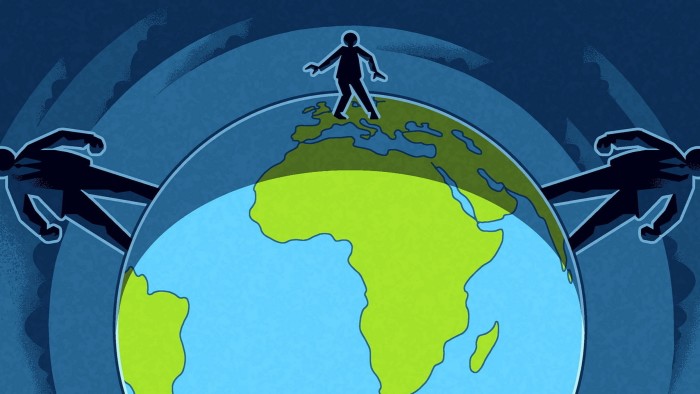Unlock the White House Watch newsletter for free
Your guide to what the 2024 US election means for Washington and the world
Last week, I attended a meeting of mainly European intellectuals and policymakers in the Italian Alps. While the topic was Europe’s future, much of the conversation revolved around decoding Donald Trump’s America. What would the president be like this time around? How would the world change over the next four years? How should Europe react?
I came away feeling that Europeans have yet to face up to three important truths.
First, Trump and others in his incoming administration are thinking carefully about geopolitical shifts that the EU has yet to really grapple with. Second, as the US decouples from China, Europe will be left facing the sharp end of Beijing’s economic stick. And finally, Europeans need to think less about policy details, and more about power.
Let’s begin with how Trump and some of his newly appointed cabinet are preparing for a future of decoupling and trade wars. While there are big differences between the Maga hardliners and the more Wall Street-friendly parts of the new administration, one belief that everyone in Trump’s camp shares is that China has been a free rider in the global trading system, and that the resulting imbalances must be corrected.
This isn’t just the view of notorious China hawks like incoming secretary of state Marco Rubio or Peter Navarro, who was just reappointed as a trade and manufacturing adviser having spent four months in prison for contempt of Congress over the January 6 2021 assault on the Capitol. It’s also something that is reflected in the nomination of Scott Bessent as Treasury secretary and even the creation of the Department of Government Efficiency (Doge) under the supervision of Elon Musk and Vivek Ramaswamy.
Bessent has been cautiously pro-tariff, and also outspoken on Beijing’s unfair devaluation of the renminbi. But perhaps more importantly, he is a student of history. As one conference participant who had worked for him directly told me, Bessent has studied the period from the late 19th to early 20th century carefully. This was, of course, a time of tremendous geopolitical and economic change, one with many similarities to today.
As analyst Luke Gromen pointed out recently, “the US was the factory of the world in 1930, while today, China is the factory of the world”. Meanwhile, the US today is “in the position of some blend of the UK, France, and Weimar Germany in 1930”. America is a global financial centre with the world’s reserve currency, but also the world’s largest debtor with a hollowed out industrial base.
The Trump administration believes it must use tariff threats against China. But actually imposing major tariffs would be inflationary, and thus unpopular. So some investors are speculating that the administration will try to weaken the dollar (something Bessent has hinted at), as well as using Doge to cut the US debt-to-GDP ratio. While many people are treating the new agency as a joke, a recent Goldman Sachs survey found that 32 per cent of market participants predicted spending cuts of more than $100bn per year.
This brings me to the second lesson for Europeans. If the US succeeds in decoupling its economy from China’s without major inflation or a market crash, the EU would be even more exposed to Chinese mercantilism, which is already a politically contentious issue.
As Mario Draghi’s report on European competitiveness has noted, “China depends on the EU to absorb its industrial overcapacity” in areas such as EVs and clean tech. Add to this a devalued dollar (which would bolster American exports relative to European outputs) and the EU’s dependence on China for things like critical minerals, and Europe might quickly find itself in a uniquely weak position relative to both the US and China.
As former EU trade commissioner Pascal Lamy put it in a main stage session at the Grand Continent summit last week: “The EU is predictable, slow, and rules based. Trump is the opposite. We’re playing a game with someone who doesn’t play by the same rules.” Indeed. Europe still spends far too much time talking about the “implementation” of various “pillars” of complex “policy directives”, and not enough grappling with the realpolitik dynamics that are reshaping both the continent and the world.
This brings me to the final point, which is about power. Europe today is like a well-dressed flâneur who is unaware he’s about to be attacked in an alley by a couple of street thugs. On one side are Trump, Musk and the big tech titans who have built and increasingly own Europe’s technology infrastructure. On the other is Beijing, which may end up hollowing out Germany’s car industry even as it holds out promises of better market access for German exporters.
During the Biden administration, European leaders have all too often hidden behind technocratic policy discussions about the ways and means of trade and competition rules to avoid dealing with the uncomfortable realities of Chinese mercantilism and a Bretton Woods system desperately in need of overhaul. Now, under Trump 2.0, there will be no avoiding them — and no clear geopolitical partner with which to fix them.
While intellectuals debated in the Alps, the French government collapsed. There’s little doubt the world is changing fast. The question is: how will Europe react?
Source link









